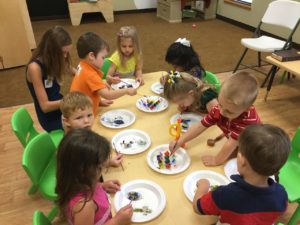Is Preschool Really That Important?
 My husband and I both work, and my mother is able to watch my daughter during the day. I really like being able to leave my daughter with her grandmother, not only because they have time to bond, but also because I know she’s in good hands. It’s also nice holding onto the money that would otherwise go to preschool every month.
My husband and I both work, and my mother is able to watch my daughter during the day. I really like being able to leave my daughter with her grandmother, not only because they have time to bond, but also because I know she’s in good hands. It’s also nice holding onto the money that would otherwise go to preschool every month.
Q: Is preschool really that important?
Will my daughter really miss out if she doesn’t get the preschool experience?
A: Preschool and kindergarten are not what they used to be. Increasingly, research shows how important preschool is for teaching children to be students.
Without preschool, your daughter may not develop the school readiness skills that other kids her age are acquiring in the following areas:
- Cognition (i.e., thinking skills)
- Self-awareness skills
- Social skills
- Pre-academic (e.g., attention/focus, matching, rhyming, counting, understanding somewhat abstract concepts, such as, same/different, opposites, similarities)
What does Preschool Readiness Mean?
In addition to the standard expectations in reading, writing and math, there is a much greater level of expectation on day one when it comes to attention and listening skills. Kindergarten is not what you remember! With a faster pace of instruction, increased demand for attention and the need for appropriate social skills. Kindergarten today is more like first grade was twenty years ago. In turn, first grade is more like second grade, and so on.
While grandma can be great help in developing your daughter’s skills in reading, writing and math, your daughter isn’t getting the chance to practice other subtle skills that come from being surrounded by a class of her peers. For instance, she isn’t getting the opportunity to practice sustaining her attention in the company of 19 other classmates. She also may not be learning to listen to multi-step instructions from a teacher and complete those steps to the teacher’s satisfaction. To be successful in kindergarten and later grades, tasks like these will be essential to your daughter’s success.
It’s helpful to consult a list of specific expectations about what children should be able to do when they enter kindergarten to better understand the importance of preschool.
The list below is from the California Department of Education’s (CDE) content standards for kindergarten in core areas, including reading and writing, as well as mental, emotional and social health:
CONTENT STANDARDS IN CORE AREAS
Reading
- Students are aware of letters, words and sounds. They apply this knowledge to read simple sentences.
- Students identify the basic facts and ideas in what they have read, heard or viewed. They use comprehension strategies (e.g., generating and responding to questions, comparing new information to what is already known).
Writing
- Students write words and brief sentences that are legible.
- Students write and speak with a command of Standard English conventions (e.g., using capital letters and periods where needed, having subject/verb agreement, etc.).
Mathematics
- Understanding the relationship between numbers and quantities (i.e., that a set of objects has the same number of objects in different situations regardless of its position or arrangement).
- Understanding and describing simple addition and subtraction.
- Using estimation strategies in computation and problem solving that involve numbers that use the ones and tens places.
- Students sort and classify objects.
- Understanding the concept of time and units to measure it; they understand that objects have properties, such as length, weight and capacity and that comparisons may be made by referring to those properties.
- Identifying common objects in their environment and describing the geometric features.
- Students collect information about objects and events in their environment.
- Students make decisions about how to set up a problem.
- Solving problems in reasonable ways and justifying their reasoning.
Mental, Emotional and Social Health
- Identify a variety of emotions.
- Describe the characteristics of families.
- Identify trusted adults at home and at school.
- Describe characteristics that make each individual unique.
- Describe and practice situations when it is appropriate to use “Please,” “Thank you,” Excuse me” and “I’m sorry.”
In line with the more challenging kindergarten experience, preschool expectations have risen as well. Most preschools have expectations regarding behavior, academics, emotional regulation and motor skill.
The CDE clearly outlines desired outcomes for preschool that are aligned to both the learning and development foundations of the state’s early care and education program and the content standards for kindergarten. These outcomes are arranged into seven areas:
DESIRED PRESCHOOL OUTCOMES
1. Self and Social Development
- Identity of self
- Recognition of own skills and accomplishment
- Expressions of empathy
- Impulse control
- Taking turns
- Awareness of diversity in self and others
- Relationships with adults
- Cooperative play with peers
- Socio-dramatic play
- Friendships with peers
- Conflict negotiation
- Shared use of space and materials
2. Language and Literacy Development
- Comprehension of meaning
- Following increasingly complex instructions
- Expression of self through language
- Language in conversation
- Interest in literacy
- Comprehension of age-appropriate text presented by adults
- Concepts about print
- Phonological awareness
- Letter and word knowledge
- Emergent writing
3. English Language Development
- Comprehension of English (Receptive language)
- Self-expression in English (Expressive language)
- Understanding and response to English literacy activities
- Symbol, letter and print knowledge in English
4. Cognitive Development
- Cause and effect
- Problem solving
- Memory and knowledge
- Curiosity and initiative
- Engagement and persistence
5. Mathematical Development
- Number sense of quantity and counting
- Number sense of mathematical operations
- Classification
- Measurement
- Shapes
- Patterning
6. Physical Development
- Gross motor movement
- Balance
- Fine motor skills
7. Health
- Personal care routines
- Healthy lifestyle
- Personal safety
Links between Preschool and Later School Success
Numerous studies show a strong correlation between a child’s participation in preschool and later positive school and community outcomes.
In terms of academics, research shows that children who participate in preschool enter kindergarten recognizing and understanding more words. Kids who have gone through preschool use a broader vocabulary than children with no preschool experience, and they are more likely to be proficient in language use overall. Preschool participants are also more likely to have satisfactory or outstanding grades in math or language arts by third grade.
School retention rates and high school graduations are also higher among children who participate in preschool.
Socially, research has shown a significant positive long-term effect of early childhood programs, including preschool, on social adjustment and the ability to regulate emotions.
So, is it worth it?
Every child should have some sort of group experience before he or she starts kindergarten. Preschool teaches our children how to be students. Children learn how to raise hands, take turns and share attention from teachers and other adults with their peers. It also teaches them appropriate separation and routine-building skills making for an easier transition to kindergarten. Children who are exposed to preschool enter school ready and eager to learn and with a solid foundation of social and behavior-management skills. Considering the many benefits, preschool is worth the investment.
If your child needs support in preparing for preschool or kindergarten, learn more about the School Readiness Programs at Children’s Health Council.
– Michael Gamel-McCormick, Deborah Amsden, Investing in Better Outcomes: The Delaware Early Childhood Longitudinal Study, April 2002, University of Delaware.
– W. Steven Barnett, “Long-Term Effects of Early Childhood Programs on Cognitive and School Outcomes,” The Future of Children: Long-Term Outcomes of Early Childhood Programs, vol 5, number 3, Winter 1995.
– Suzanne W. Helburn, Carollee Howes, Child Care Cost and Quality, The Future of Children, Financing Child Care, vol 6, no2, Summer/Fall 1996.
To schedule an evaluation or to get advice about your child’s challenges, call or email a CHC Care Coordinator at 650.688.3625 or careteam@chconline.org




